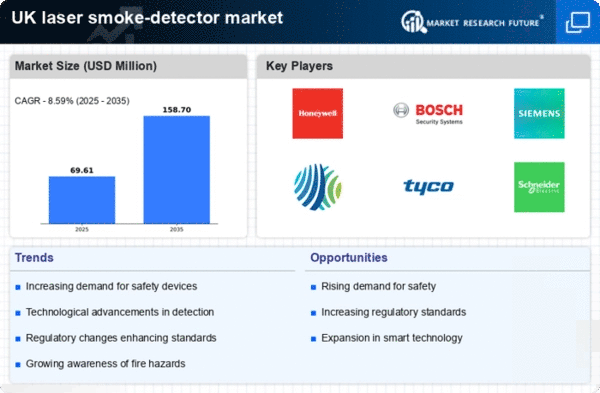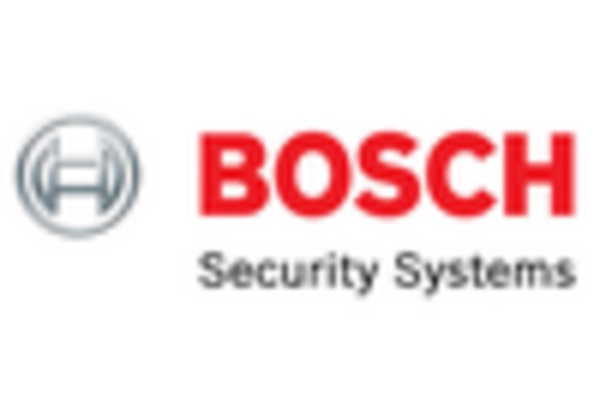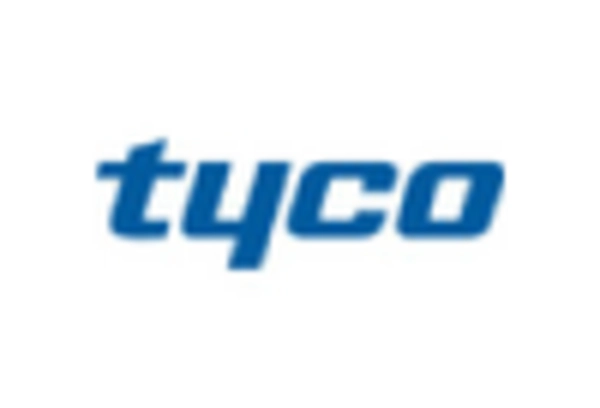Rising Awareness of Fire Safety
In the UK, there is a growing awareness of fire safety among consumers and businesses, which is positively impacting the laser smoke-detector market. Educational campaigns and initiatives by fire safety organizations have highlighted the importance of early fire detection systems. This heightened awareness is leading to increased investments in advanced smoke detection technologies, particularly laser smoke detectors, which offer superior performance compared to traditional models. The market is likely to see a significant uptick in sales as individuals and organizations recognize the value of investing in reliable fire safety solutions. Furthermore, the laser smoke-detector market is expected to benefit from the increasing number of fire safety training programs, which emphasize the need for effective detection systems, potentially driving market growth by 20% in the coming years.
Increased Construction Activities
The ongoing increase in construction activities across the UK is significantly influencing the laser smoke-detector market. As new residential and commercial buildings are erected, there is a growing need for advanced fire safety systems to ensure compliance with safety regulations. Developers are increasingly opting for laser smoke detectors due to their effectiveness in detecting smoke in large spaces and their ability to minimize false alarms. This trend is expected to continue, with the construction sector projected to grow by 10% annually, thereby driving demand for laser smoke detectors. The laser smoke-detector market is likely to benefit from this construction boom, as more properties are equipped with state-of-the-art fire detection systems, potentially increasing market penetration in the next few years.
Shift Towards Smart Building Technologies
The shift towards smart building technologies is reshaping the laser smoke-detector market in the UK. As buildings become more integrated with smart technologies, the demand for advanced fire detection systems that can communicate with other smart devices is on the rise. Laser smoke detectors, with their ability to connect to building management systems, are becoming increasingly popular among property developers and facility managers. This integration not only enhances fire safety but also contributes to overall building efficiency. The market is expected to grow as more stakeholders recognize the benefits of incorporating laser smoke detectors into their smart building frameworks. Projections indicate that the laser smoke-detector market could see a growth rate of 22% as the trend towards smart technologies continues to gain momentum.
Regulatory Compliance and Safety Standards
The laser smoke-detector market is experiencing growth driven by stringent regulatory compliance and safety standards in the UK. Authorities are increasingly mandating advanced fire detection systems in commercial and residential buildings to enhance safety. The UK government has implemented regulations that require smoke detectors to meet specific performance criteria, which has led to a surge in demand for laser smoke detectors. These devices are known for their high sensitivity and reliability, making them suitable for environments where early detection is crucial. As a result, manufacturers are focusing on developing products that comply with these regulations, thereby expanding their market presence. The laser smoke-detector market is projected to grow as more businesses and homeowners prioritize compliance with safety standards, potentially increasing market value by approximately 15% over the next five years.
Technological Innovations in Detection Systems
Technological innovations are a key driver in the laser smoke-detector market, as advancements in sensor technology and data analytics enhance the performance of smoke detection systems. The integration of laser technology allows for more precise detection of smoke particles, reducing false alarms and improving response times. As manufacturers invest in research and development, the introduction of smart features, such as connectivity with other safety systems, is becoming more prevalent. This trend is likely to attract a broader customer base, including both residential and commercial sectors. The laser smoke-detector market is projected to expand as these innovations become more mainstream, with an estimated growth rate of 18% over the next five years, driven by consumer demand for more effective and reliable fire safety solutions.
















